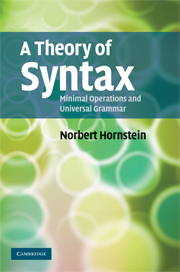Book contents
- Frontmatter
- Contents
- Preface
- 1 Minimalism and Darwin's Problem
- 2 Deriving c-command
- 3 Labels, recursion and movement
- 4 Some thoughts on adjunction
- 5 The emerging picture: Basic operations, FL and the Minimalist Program
- 6 Stop AGREEing! Keep Moving!
- 7 Conclusions, consequences and more questions
- References
- Index
6 - Stop AGREEing! Keep Moving!
Published online by Cambridge University Press: 01 July 2009
- Frontmatter
- Contents
- Preface
- 1 Minimalism and Darwin's Problem
- 2 Deriving c-command
- 3 Labels, recursion and movement
- 4 Some thoughts on adjunction
- 5 The emerging picture: Basic operations, FL and the Minimalist Program
- 6 Stop AGREEing! Keep Moving!
- 7 Conclusions, consequences and more questions
- References
- Index
Summary
Introduction
The basic operations hypothesis limned in the earlier chapters does not include a feature checking procedure. This is an important omission, especially against the adopted minimalist background. Agreement in various forms has been a staple of minimalist analyses from the outset. Indeed, it has been a feature of every generative approach to grammar. The reason for this is that agreement phenomena are ubiquitous within natural language. Subjects agree with predicates, antecedents with their dependents, subordinate tenses with matrix tenses, modifiers with modifiees, etc. It is hard to find a grammar of a language that does not spend considerable time on its agreement patterns. As a result, at pain of descriptive inadequacy, every theory of grammar must contain an operation that generates agreement structures.
Minimalist grammars do so as well, but with two twists. First, agreement is now an important operation and not just a widespread phenomenon. In particular, since Chomsky (1993), minimalists have assumed that operations apply because they must, not because they can (e.g. as in GB). This is canonized in the Principle of Greed, which requires that operations check (uninterpretable) features when they apply. As agreement is the process that checks features, minimalist approaches take it to be a central operation of the grammar. Second, in more recent minimalist analyses, agreement is understood to be, in some sense, more basic than movement in that Move is a composite operation that contains agreement as a sub-part.
- Type
- Chapter
- Information
- A Theory of SyntaxMinimal Operations and Universal Grammar, pp. 126 - 154Publisher: Cambridge University PressPrint publication year: 2008



